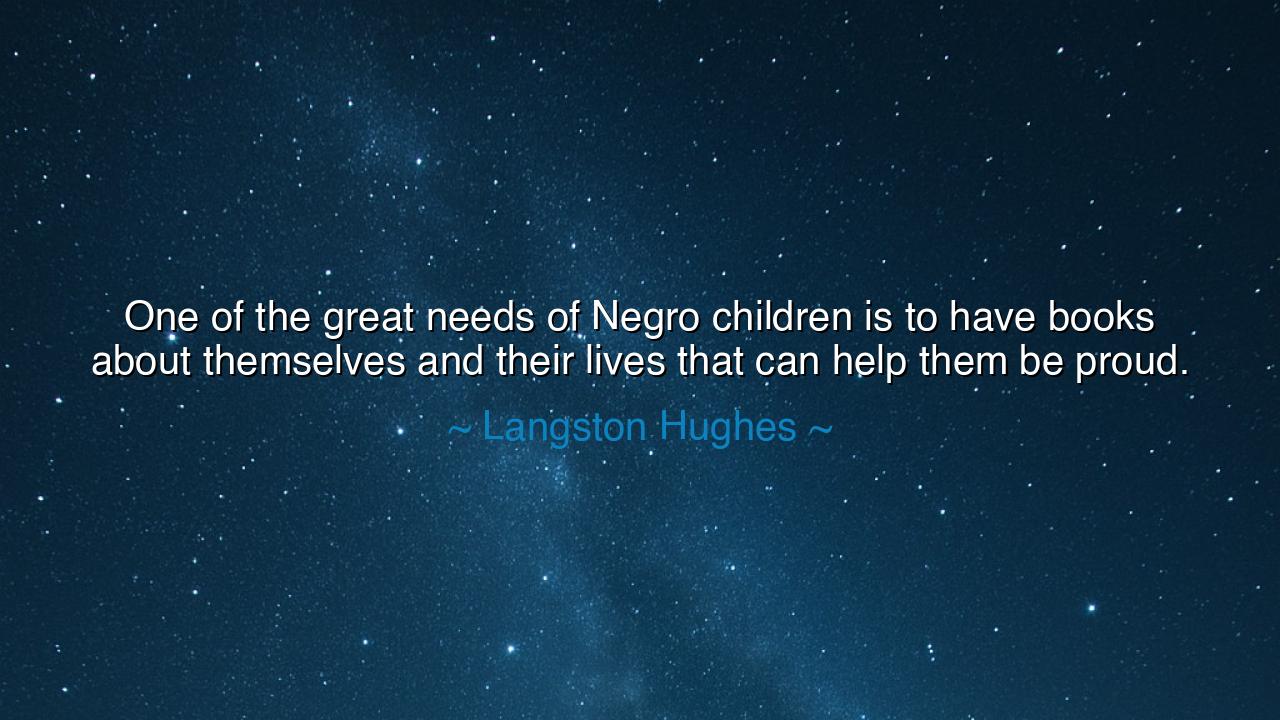
One of the great needs of Negro children is to have books about
One of the great needs of Negro children is to have books about themselves and their lives that can help them be proud.






“One of the great needs of Negro children is to have books about themselves and their lives that can help them be proud.” — Langston Hughes
In this luminous and compassionate declaration, Langston Hughes, the poet of the people and the voice of the Harlem Renaissance, speaks not merely of books, but of identity, dignity, and the sacred right to self-recognition. His words rise from a time when the mirrors of society were clouded—when the images reflected back to Black children were distorted or erased entirely. Hughes understood that without seeing themselves in stories, in heroes, in the written word, a generation would grow up believing they were invisible. Thus, he proclaimed that the literature of a people is not a luxury, but a lifeline—a means through which the young may see the beauty, strength, and worth of their own existence.
This truth was born from the soil of America’s racial struggle. Hughes wrote during an age when Black voices were often silenced, when children of color opened books only to find that their kind were missing from its pages or misrepresented within them. He saw that without stories of their own, Negro children could not fully know who they were. Their sense of pride and belonging—so essential to the human spirit—was starved. And so he wrote, he spoke, he dreamed of a world where every Black child could look upon a page and say, “This, too, is me. I exist. I matter. I belong.”
The poet’s words echo through history like a bell calling to the conscience of a nation. From the slave songs sung in secret to the poetry of the Harlem Renaissance, Black art has always been a rebellion against erasure—a reclamation of humanity. Hughes knew that stories could free the mind even when the body was bound, that a child armed with pride could resist a world bent on his submission. His own pen became a lantern, shining light into the corners of American life where the truth had long been hidden. Through works like The Dream Keeper and The Ways of White Folks, he gave Black youth stories not of despair, but of resilience, humor, and hope.
Consider, for example, the work of Faith Ringgold, who, decades later, followed in Hughes’s footsteps through her children’s book Tar Beach. In it, a young Black girl lies on a rooftop in Harlem, looking up at the stars, dreaming of flying over the city—free, proud, and powerful. This story, simple yet profound, fulfills Hughes’s vision. It shows a Black child not as a shadow in someone else’s story, but as the shining center of her own. In her imagination, she becomes limitless, and in that image, every Black child who reads the book sees a reflection of greatness. That is the power of representation—to take what was denied and make it sacred again.
Hughes’s insight is not only for the children of his own people but for all humankind. For every community, every nation, and every soul, pride grows from recognition. When we see ourselves in art, we learn to cherish who we are; when we are erased, we learn to doubt it. A culture that denies its children the truth of themselves steals from them the courage to dream. Thus, Hughes’s words are both a cry and a command: Tell your stories. Write your truths. Honor your own image. For only when the young see their faces reflected in beauty can they believe that beauty lies within them.
The lesson, then, is this: representation is not vanity—it is validation. The stories we tell shape the souls we raise. If we want strong, proud, wise children, we must give them stories of strength, pride, and wisdom that bear their likeness. Parents, teachers, and creators must ensure that every child, no matter their color or culture, can open a book and find there a mirror, not a wall.
And to those who walk in the spirit of Langston Hughes, let these words be a guide: create what you did not see. Write the stories that were denied to you. Paint the faces that were once hidden. Speak for those who were silenced. For every voice raised in truth is a torch passed to the next generation, and every child who grows up proud becomes a guardian of that light.
Thus, the poet’s ancient wisdom endures: the written word is more than ink—it is the shaping of identity, the awakening of pride, the affirmation of being. And as long as there are children who search for themselves in the pages of the world, Hughes’s call will echo on: give them stories that remind them they are worthy, they are beautiful, they are enough.






AAdministratorAdministrator
Welcome, honored guests. Please leave a comment, we will respond soon